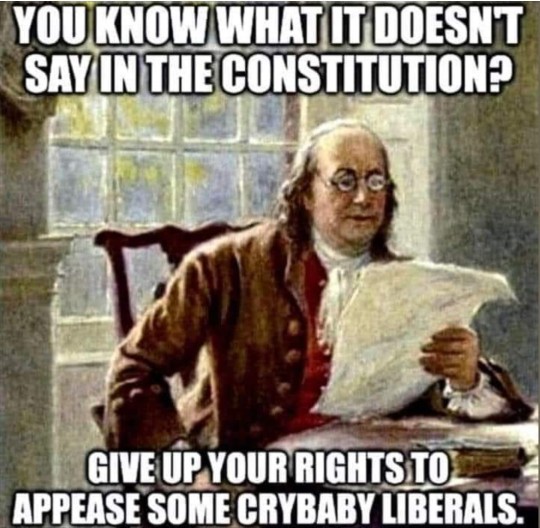#us constitution
Text

#america#freedom#2nd amendment#us constitution#second amendment#fuck around and find out#girls with guns#country girls#pro 2a#girlsandguns
2K notes
·
View notes
Text
‼️LISTEN CLOSELY‼️
The difference between a Democracy and a Constitutional Republic
America is a Constitutional Republic!!!
#america#american#us constitution#pray for america#god bless america#christianity#christ jesus#yieldfruit#christian
366 notes
·
View notes
Text
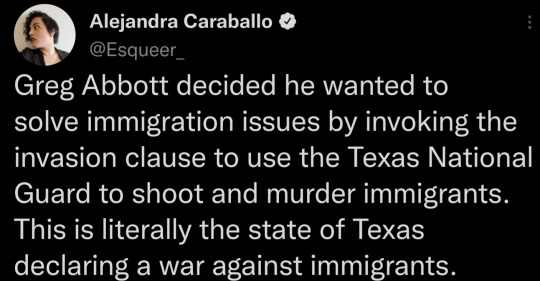
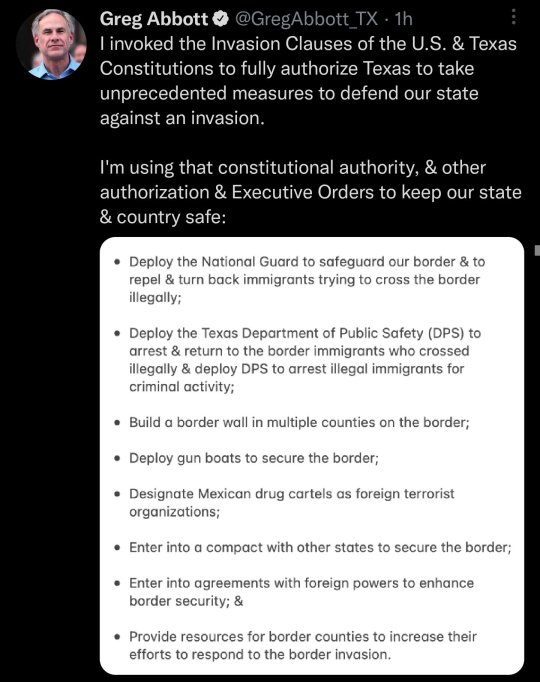
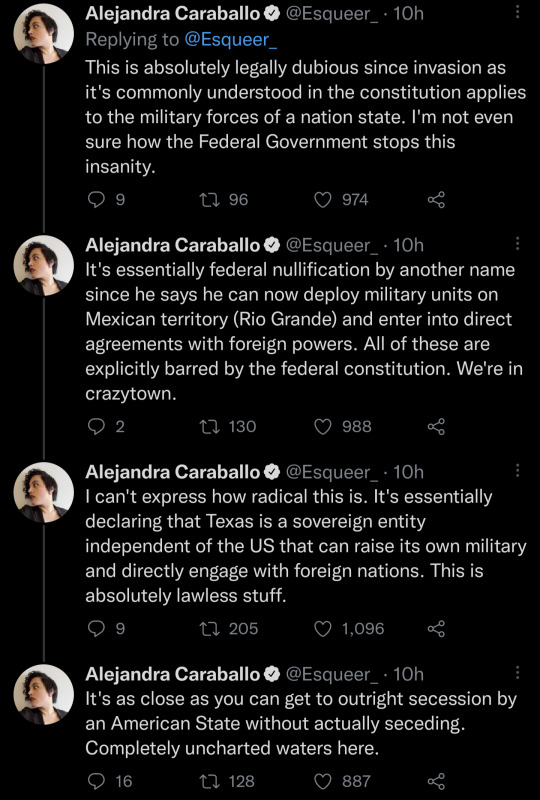
#us politics#news#2022#twitter#tweet#republicans#conservatives#gov. greg abbott#texas#invasion clause#texas national guard#immigrants#immigration#us constitution#texas constitution#national guard#texas department of public safety#alejandra caraballo#secession#us mexico border#mexico#drug cartels
3K notes
·
View notes
Text
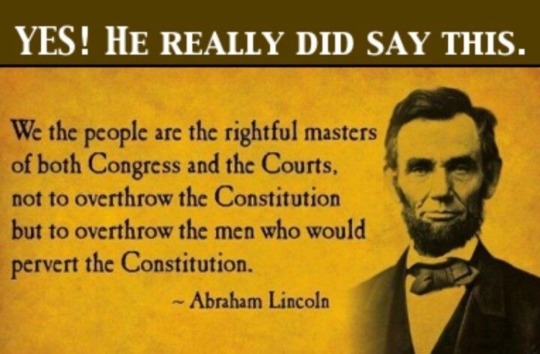
#quotations#MAGA#donald trump#lock him up#democracy#US Constitution#insurection#republican party#january 6
171 notes
·
View notes
Text


193 notes
·
View notes
Text
Forget hush money payments to porn stars hidden as business expenses. Forget showing off classified documents about Iran attack plans to visitors, and then ordering the pool guy to erase the security tapes revealing that he was still holding on to documents that he had promised to return. Forget even corrupt attempts to interfere with election results in Georgia in 2020.
The federal indictment just handed down by special counsel Jack Smith is not only the most important indictment by far of former President Donald Trump. It is perhaps the most important indictment ever handed down to safeguard American democracy and the rule of law in any U.S. court against anyone.
For those who have been closely following Trump’s attempt to subvert the results of the 2020 election, there was little new information contained in the indictment. In straightforward language with mountains of evidence, the 45-page document explains how Trump, acting with six (so far unnamed, but easily recognizable) co-conspirators, engaged in a scheme to repeatedly make false claims that the 2020 election was stolen or rigged, and to use those false claims as a predicate to try to steal the election. The means of election theft were national, not just confined to one state, as in the expected Georgia prosecution. And they were technical—submitting alternative slates of presidential electors to Congress, and arguing that state legislatures had powers under the Constitution and an old federal law, the Electoral Count Act, to ignore the will of the state’s voters.
But Trump’s corrupt intent was clear: He was repeatedly told that the election was not stolen, and he knew that no evidence supported his outrageous claims of ballot tampering. He nonetheless allegedly tried to pressure state legislators, state election officials, Department of Justice officials, and his own vice president to manipulate these arcane, complex election rules to turn himself from an election loser into an election winner. That’s the definition of election subversion.
He’s now charged with a conspiracy to defraud the United States, a conspiracy to willfully deprive citizens the right to vote, a conspiracy to obstruct an official proceeding, and obstructing that official proceeding. If you’re doing the math, that is four new counts on top of the dozens he faces in the classified documents case in Florida and the hush money case in New York.
So far Trump has not been accountable for these actions to try to steal an American election. Although the House impeached Trump for his efforts soon after they occurred, the Senate did not convict. Senate Minority Leader Mitch McConnell, in voting against conviction in the Senate despite undeniable evidence of attempted election subversion by his fellow Republican, pointed to the criminal justice system as the appropriate place to serve up justice. But the wheels of justice have turned very slowly. Reports say that Attorney General Merrick Garland was at first too cautious about pursuing charges against Trump despite Trump’s unprecedented attack on our democracy. Once Garland appointed Jack Smith as a special counsel to handle Trump claims following the release of seemingly irrefutable evidence that Trump broke laws related to the handling of classified documents, the die was cast.
It is hard to overstate the stakes riding on this indictment and prosecution. New polling from the New York Times shows that Trump not only has a commanding lead among those Republicans seeking the party’s presidential nomination in 2024; he remains very competitive in a race against Joe Biden. After nearly a decade of Trump convincing many in the public that all charges against him are politically motivated, he’s virtually inoculated himself against political repercussions for deadly serious criminal counts. He’s miraculously seen a boost in support and fundraising after each indictment (though recent signs are that the indictments are beginning to take a small toll). One should not underestimate the chances that Donald Trump could be elected president in 2024 against Joe Biden—especially if Biden suffers any kind of health setback in the period up to the election—even if Trump is put on trial and convicted of crimes.
A trial is the best chance to educate the American public, as the Jan. 6 House committee hearings did to some extent, about the actions Trump allegedly took to undermine American democracy and the rule of law. Constant publicity from the trial would give the American people in the middle of the election season a close look at the actions Trump took for his own personal benefit while putting lives and the country at risk. It, of course, also serves the goals of justice and of deterring Trump, or any future like-minded would-be authoritarian, from attempting any similar attack on American democracy ever again.
Trump now has two legal strategies he can pursue in fighting these charges, aside from continuing to attack the prosecutions as politically motivated. The first strategy, which he will no doubt pursue, is to run out the clock. It’s going to be tough for this case to go to trial before the next election given that it is much more factually complex than the classified documents or hush money cases. There are potentially hundreds of witnesses and theories of conspiracies that will take much to untangle. Had the indictment come any later, I believe a trial before November 2024 would have been impossible. With D.C. District Judge Tanya Chutkan—a President Barack Obama appointee who has treated previous Jan. 6 cases before her court with expedition and seriousness—apparently in charge of this case, there is still a chance to avoid a case of justice delayed being justice denied.
If Trump can run out the clock before conviction and be reelected, though, he can get rid of Jack Smith and appoint an attorney general who will do his bidding. He could even try to pardon himself from charges if elected in 2024 (a gambit that may or may not be legal). He could then sic his attorney general on political adversaries with prosecutions not grounded in any evidence, something he has repeatedly promised on the campaign trail.
Trump’s other legal strategy is to argue that prosecutors cannot prove the charges. For example, the government will have to prove that Trump not only intended to interfere with Congress’ fair counting of the electoral college votes in 2020 but also that Trump did so “corruptly.” Trump will put his state of mind at issue, arguing that despite all the evidence, he had an honest belief the election was being stolen from him.
He also will likely assert First Amendment defenses. As the indictment itself notes near the beginning, “the Defendant has a right, like every American, to speak publicly about the election and even to claim, falsely, that there had been outcome-determinative fraud during the election and that he had won.” But Trump did not just state the false claims; he allegedly used the false claims to engage in a conspiracy to steal the election. There is no First Amendment right to use speech to subvert an election, any more than there is a First Amendment right to use speech to bribe, threaten, or intimidate.
Putting Trump before a jury, if the case can get that far before the 2024 elections, is not certain to yield a conviction. It carries risks. But as I wrote last year in the New York Times, the risks to our system of government of not prosecuting Donald Trump are greater than the risks of prosecuting him.
It’s not hyperbole to say that the conduct of this prosecution will greatly influence whether the U.S. remains a thriving democracy after 2024.
#us politics#news#slate#false slate of electors#republicans#donald trump#conservatives#2023#United States v. Donald Trump#trump administration#2020 election#Electoral Count Act#us constitution#14th amendment#ballot tampering#election subversion#Department of Justice#jack smith#ag merrick garland#biden administration#conspiracy to defraud the United States#conspiracy to willfully deprive citizens the right to vote#conspiracy to obstruct an official proceeding#obstruction of congress#2024 presidential race#2024 elections#Judge Tanya Chutkan
174 notes
·
View notes
Text
Some things you CAN’T do in America if you’re a convicted felon:
Vote
Serve on a jury
Own firearms
Receive public assistance (food, housing, education, etc)
Certain employment (job discrimination)
Maintain parental rights
Bear Arms
Become a police officer
Lose voting rights during and after incarceration
Travel abroad
(source)
Things you CAN do in America if you’re a convicted felon:
Run for president
Win, and presumably still be president while serving your prison sentence behind bars
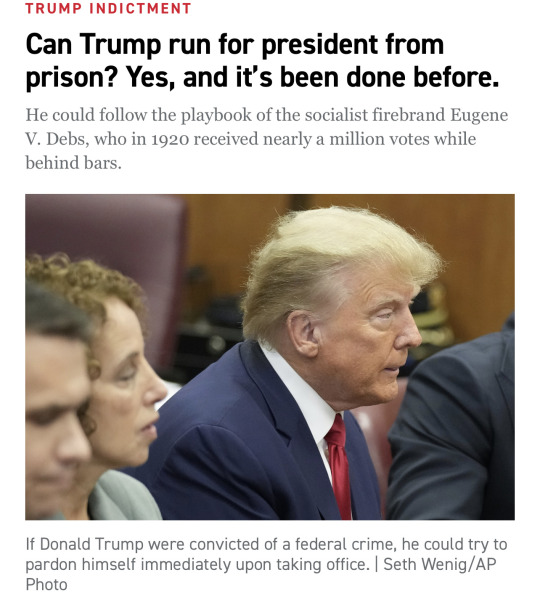
(source)
Obviously this is not meant to be a comprehensive list, and some of these things may vary widely from state to state—but CONSTITUTIONALLY speaking, the “can do” list is 100% accurate
And this also isn’t me agreeing with all of the “can’t do” exclusions either
Formerly incarcerated people are still human beings who are deserving of food, housing, gainful employment, higher education, and health care—not to mention common decency and respect
It’s just crazy that Trump could still become president even if he were convicted
209 notes
·
View notes
Photo



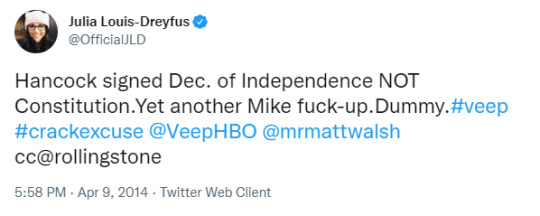
123 notes
·
View notes
Photo
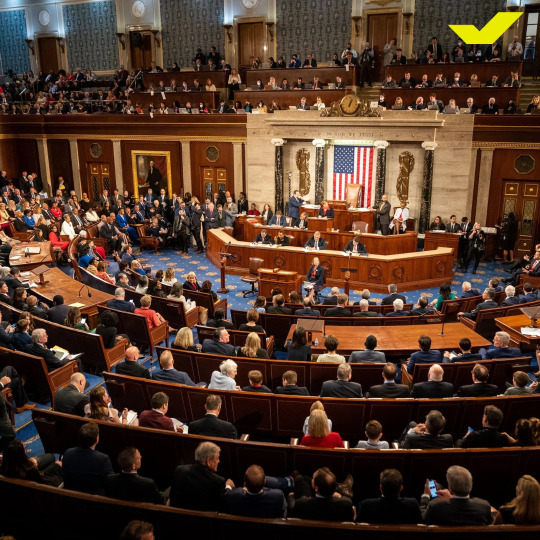

On This Day in 1913: The 17th Amendment was ratified, giving VOTERS the power to elect U.S. Senators instead of letting the state legislatures decide.
As women and people of color won the right to vote, they took their power to the ballot box and voted for Senators that better represented the diversity of our country.
The power should be in the hands of the people. ✊🏽
Exercise YOUR power at the ballot box this year. Register to vote at weall.vote/register.
#OTD#on this day#onthisday#history#1913#17th amendment#the 17th amendment#u.s. constitution#constitution#us constitution#voting#vote#senators#senator#senate#us senate#ballot box#election#elections#popular vote#popular election#diversity#power#register to vote
27 notes
·
View notes
Text

#america#freedom#2nd amendment#us constitution#second amendment#fuck around and find out#girls with guns#country girls#pro 2a#girlsandguns
2K notes
·
View notes
Text

#us politics#can conservatives read? challenge#republicans#conservatives#gop#us constitution#holy bible#read the room#memes#shitpost
196 notes
·
View notes
Text

"We The People"
55 notes
·
View notes
Text
Never mind the 22nd amendment. Some Trumpsters are already talking about a THIRD Trump term.
The American Conservative magazine published an article last week in which the author, Peter Tonguette, argued that Trump should be able to run for a third term in office in 2028. This drew some attention in non-Trump circles as a potential trial balloon by Project 2025, the authoritarian policy agenda that is guiding Trumpworld right now.
Tonguette argued that Trump’s victory in the GOP primary contest this year shows that voters still support him—and that they should be allowed to do so indefinitely. “As the primary season has shown us, the Republicans have not moved on from Trump—yet the Twenty-second Amendment works to constrain their enthusiasm by prohibiting them from rewarding Trump with re-election four years from now,” he wrote, perhaps getting ahead of himself a bit.
I do not doubt that Trump would run for a third term if he could. He has addressed the possibility before, suggesting in 2020 that he should get to run for one “because they spied on my campaign,” referring to his political opponents. And at a closed-door fundraiser in 2018, Trump also favorably referred to Chinese President Xi Jinping for eliminating the two-term limit in that country. “He’s now president for life, president for life, and he’s great,” he reportedly told his supporters. “And look, he was able to do that. I think it’s great. Maybe we’ll have to give that a shot someday.”
Maybe Trump's campaign slogan for 2028 should be: Make America Belarus. The dictator of Belarus, a Putin satellite, has been using rigged elections to remain in power since 1994.
Never mind the US Constitution. Trump's trained seals on the US Supreme Court will gladly find some loophole allowing him to be president in perpetuity.
If somebody says he wants to be a dictator, believe him – especially if he's already a big fanboy of despots like Vladimir Putin, Kim Jong-un, and Xi Jinping.
It's almost always easier to prevent a dictator from taking power than it is to get rid of one who is already in power.
#donald trump#republicans#us constitution#dictatorship#the 22nd amendment#dictator on day one#trump's third term#project 2024#peter tonguette#democrats = democracy republicans = dictatorship#election 2024#vote blue no matter who
20 notes
·
View notes
Text
Out Representative-elect Robert Garcia (D-CA) may not have been able to get sworn in yesterday due to Republicans’ inability to elect a Speaker of the House, but he has plans for when he finally can be sworn in.
When he takes his oath of office, he’ll swear on a copy of the Constitution, and, beneath that, an original Superman #1 comic from 1939, a photo of his parents, and a copy of his citizenship certificate.
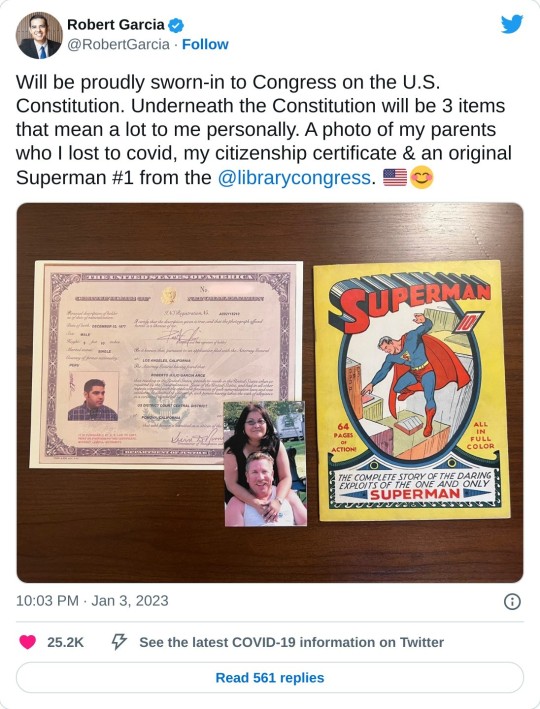
Garcia came to the U.S. from Peru with his family when he was five-years-old and has said that naturalization was “his proudest moment” and the reason he started a career in politics. His parents died in 2020 of COVID-19.
He was the youngest and first out LGBTQ+ person elected as mayor of Long Beach, California (a position he served in from 2014 to 2022). During his time as mayor, he worked with businesses to reduce their environmental impacts, filled vacancies on citizen commissions with diverse and female members, and worked to improve local infrastructure as well as financial opportunities for local artists and home-based business owners.
He’s also an avid comic book fan.
In November, he tweeted a photo of the Superman #1 comic along with Amazing Fantasy #15, in which Spider-Man first appeared, saying he didn’t know which one he would first check out from the Library of Congress.
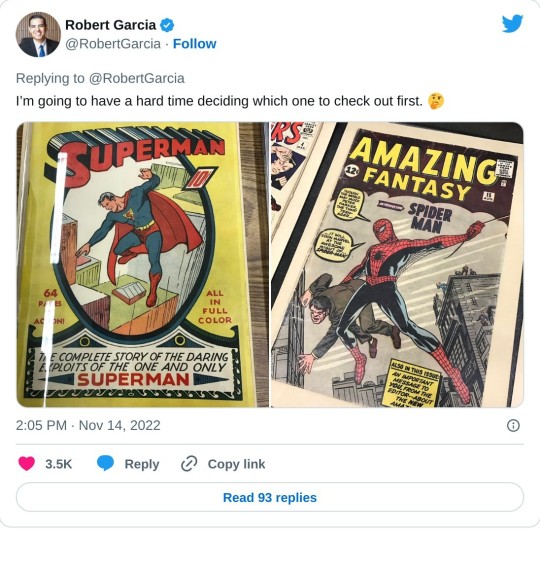
While many members of Congress will be sworn in on Bibles, they are not legally required to do so. Former Rep. – and current Minnesota attorney general – Keith Ellison (D-MN), who was the first Muslim person elected to Congress in 2007, was sworn in on a copy of the Quran owned by Thomas Jefferson.
Theodore Roosevelt wasn’t sworn in with any object after the assassination of William McKinley in 1901. And in 2014 Suzi LeVine was sworn in as U.S. ambassador to Switzerland and Liechtenstein on a Kindle with a copy of the Constitution open.
“I wanted to use a copy that is from the twenty-first century and that reflects my passion for technology and my hope for the future,” she said at the time.
New members of the House can’t be sworn in until a speaker is elected. Yesterday, after three votes, no candidate for Speaker was able to get a majority of votes because of a faction of Republicans voting against Rep. Kevin McCarthy (R-CA). The Democrats’ candidate – Rep. Hakeem Jeffries (D-NY) – got the most votes in each round of voting, and around 20 Republicans – including anti-LGBTQ+ Reps. Paul Gosar (R-AZ), Lauren Boebert (R-CO), Bob Good (R-VA), and Matt Gaetz (R-FL) – voted for Rep. Jim Jordan (R-OH).
Jordan himself nominated and voted for McCarthy.
The House adjourned without a new Speaker elected.
#us politics#news#2023#twitter#tweet#Democrats#lgbtq nation#robert garcia#us house of representatives#118th congress#detective comics#us constitution#library of congress#lgbtqia+#lgbtqia+ representation#lgbtqia+ pride#us history#President Theodore Roosevelt#Suzi LeVine#Keith Ellison#superman#California
512 notes
·
View notes
Photo


In the New York Magazine article, “The Future of Trumpism: The greatest threat to Donald Trump’s hold on the GOP comes from Ron DeSantis, who may be more MAGA than the MAGA king himself,” Jonathan Chait discusses some of Ron DeSantis’s more disturbing beliefs about the U.S. Constitution and wealth.
Basically, DeSantis seems to believe that the Constitution was designed to protect elite wealth from being redistributed to the working classes. If DeSantis were to be elected president, there’s a good chance he would try to undo every progressive social safety net program we have created since the New Deal, including Social Security, Medicare, Medicaid, the ACA, SNAP, and TANF.
Below are some excerpts from DeSantis’s 2011 book Dreams From Our Founding Fathers: First principles in the age of Obama:
[Benjamin] Franklin and other Founding Fathers believed that respect for individual property rights was the sine qua non of a free society, and regarded the so-called “leveling spirit,” which seeks to equalize property through government action, as a danger that American institutions needed to check…. How to craft a government based on popular consent that did not devolve into popular majorities voting themselves the property of others was one of the main concerns for Madison and his colleagues at the Constitutional Convention.
[...]
Madison pulled no punches about specifying the particular types of faction that a republican form of government needed to guard against. “A rage for paper money, for an abolition of debts, for an equal division of property, or for any other improper or wicked project”…. Madison…also viewed these “wicked projects” as inimical to fundamental notions of justice and individual liberty. As a matter of first principle, the republic needed to be constructed to prevent such projects from ever coming into being.
[emphasis added]
--Ron DeSantis (2011, pp. 123, 128-129)
If Ron DeSantis wins the White House in 2024 and has a GOP Congress, and a Federalist Society dominated Supreme Court, he will be able to dismantle the social safety net in the U.S. with impunity. We cannot let that happen.

[edited]
____________________
Ron DeSantis Photo-Illustration: Eddie Guy & Photo: Joe Raedle/Getty Images (before edits & title caption); Maya Angelou quote image source (before edits & a newer version of Maya Angelou’s signature)
#ron desantis#dreams from our founding fathers#us constitution#protection of wealth#neofascism#jonathan chait#new york magazine#intelligencer#my edits
183 notes
·
View notes
